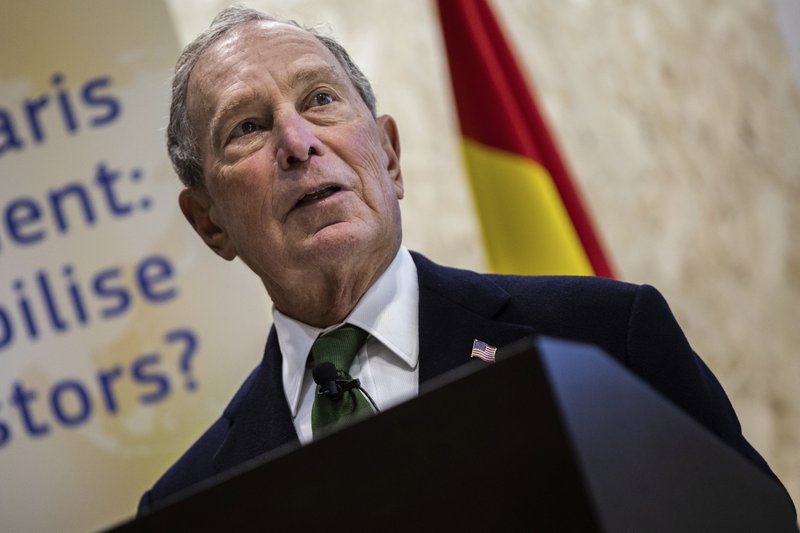New York billionaire and presidential candidate Michael Bloomberg led a high-powered charge against President Donald Trump’s climate policies Tuesday, assuring activists, scientists and politicians from around the world that Americans are committed to reducing greenhouse gas emissions “even with a climate change denier in the White House.”
Bloomberg, who launched his 2020 campaign less than three weeks ago, spoke during a trip to the U.N. global climate conference in Madrid, even as the official U.S. delegation at a booth nearby kept a low profile.
Together with former Secretary of State John Kerry and former Vice President Al Gore, Bloomberg constituted a sort of shadow delegation at a time when Trump is moving to pull the United States out of the 2015 Paris climate accord.
As other Democratic candidates have done, Bloomberg vowed to immediately rejoin the pact if elected president.
“The first thing you do, Day One, is you say we’re going back in,” he said. “That’s a no-brainer.”
The former New York mayor has helped support and fund a private push to get U.S. states, cities and businesses to abide by the terms of the Paris accord.
He touted a report that said non-federal actors representing more than two-thirds of the U.S. economy are on course to cut the nation’s emissions 37% by 2030 compared with 2005 levels. If the next administration joins in, that figure could rise to 49%, bringing the U.S. roughly in line with the Paris treaty, according to the report.
“Americans are willing to continue to work, even with a climate change denier in the White House,” the 77-year-old businessman told a packed room.
The U.S. remains a party to the climate pact until Nov. 4, 2020 — the day after the U.S. presidential election.
Bloomberg, who has made climate change a central pillar of his bid for the nomination, also called for an end to U.S. subsidies and tax breaks for fossil fuels, which are one of the main sources of greenhouse gases.
Scientists say their use needs to end by the middle of the century if average temperatures on Earth are to rise no more than 1.5 degrees Celsius (2.7 degrees Fahrenheit) by 2100, the target set in the Paris agreement.
By taking aim at fossil fuel subsidies, Bloomberg is challenging both a powerful American industry and Trump, who has championed the extraction of oil, gas and coal.
According to a report by the International Monetary Fund, fossil fuel subsidies in the U.S. amounted to $649 billion in 2015. Only China spent more tax money — $1.4 trillion — to keep fossil fuel prices low that year.
The IMF report calculated that if prices for fossil fuels reflected their true cost, including the environmental damage they cause, consumption would drop so much that global carbon emissions would be 28% lower.
Bloomberg has long been an advocate of international efforts to curb global warming and until recently was the U.N.’s envoy for climate action. After the Trump administration stopped paying U.S. dues to the global body’s climate office, Bloomberg’s philanthropic organization stepped in to foot the bill. But his attendance at this year’s summit stands out because of his presidential ambitions.
The Trump administration sent a low-level delegation to the talks, led by a career diplomat, Marcia Bernicat , former U.S. ambassador to Bangladesh.
Other prominent Americans attending the 12-day conference include Gore and Kerry, who said the absence of any high-profile representative from the White House at the talks “speaks for itself.”
“It’s an absence of leadership,” Kerry said. “It’s a tragedy.”
Kerry, who as America’s top diplomat at the time was key to negotiating the Paris accord, called on citizens to hold business and political leaders accountable in the fight against climate change.
Germany’s environment minister, Svenja Schulze, welcomed the presence of rival American delegations.
“We should keep showing that it’s not just Trump, but that there is a lot happening in the United States on the issue of emissions reduction and climate action,” she said.
One climate policy expert questioned the narrow focus of Bloomberg’s report, however.
“The Paris agreement isn’t only about reducing emissions,” said Kevin M. Adams, a research fellow at the Stockholm Environment Institute. “It is also about managing the risks of living in a warming world, including the impacts we are already experiencing today, and providing finance to developing countries who have contributed so little to the problem but will be affected first and worst by climate change.”
The talks in Madrid shifted into higher gear Tuesday as ministers arrived to tackle some of the thorny political issues still on the table.
Despite growing awareness of climate change and warnings from scientists that drastic action is needed, only a few countries sent their prime ministers or presidents to negotiate, worrying some observers.
“It shows that there has not yet been an internalization of the emergency situation that we are in, that so few heads of state are coming to Madrid and ready to roll up their sleeves and do what it takes to actually respond to the science,” said Jennifer Morgan, executive director of Greenpeace International.
Environmental activists are hoping the European Union will present an ambitious plan Wednesday on cutting emissions that will send a message of hope. Climate change has become a growing political issue in Europe, with mass protests by young people such as Swedish activist Greta Thunberg, who is delivering a speech at the U.N. gathering on Wednesday.
American actor Harrison Ford said it is time to listen to those “who will inherit what we have wrought.”
“Their future has already been diminished by our past,” he said at an event alongside Bloomberg.
(AP)











